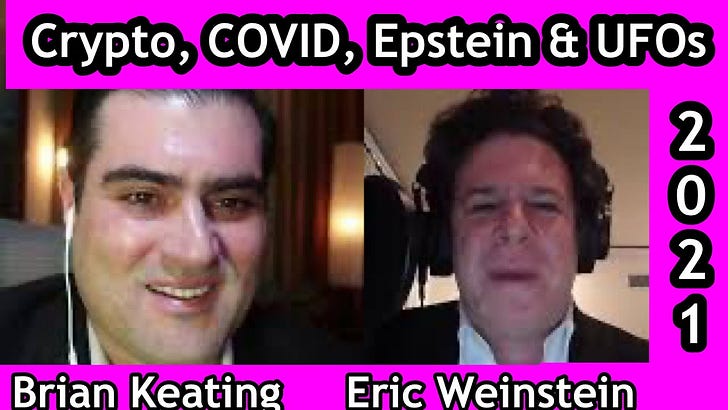“This is nonsense. We have to recognize, we have leadership, and I don’t know why Christopher Sweat is in this conversation.”
For context: Dr. Brian Keating, a friend of mine and a Professor of Physics at the University of California, San Diego, is hosting me on his podcast in weeks. We did record the episode! I hope you enjoy it. I’ll post it here soon. You can subscribe to the podcast, Into the Impossible by clicking here. Dr. Keating was in discussion with Eric Weinstein in the above video. If you aren’t familiar with Eric, he is the Managing Director of Theil Capital, publicly contests issues of politics, society, and physics, and has appeared on Joe Rogan and Lex Friedman’s Podcasts regularly. Just google him. Nonetheless, Keating posed a question to Eric in response to an idea I mentioned in our episode about Black Intellectuals.
At 34:38, Brian sought to get Eric’s reaction to some of my thoughts. Brian brought up a rough synopsis of my critique of the term ‘black intellectual.’ Now, I can’t remember what I said on Brian’s podcast recording, so I’ll be reminded when it comes out - but Eric’s response is in the quote above!
I’ll give Eric the benefit of the doubt. The frame of the question and tie back to physics was a little tough to follow. At some point, I would like to dig deeper into the idea of public intellectuals with him directly.
Alright, there is some context.
Now, I am writing to lay down my personal views on the idea of ‘black intellectuals.’
“The choice of becoming a black intellectual is an act of self-imposed marginality; it assures peripheral status in and to the black community.”
Before I ever thought of ascending through the Academy, I held strong opinions.
Straight up.
Earlier in the year, a journalist reached out to me to get my thoughts for a piece that would cover the perspectives of what she called ‘black intellectuals.’
I told her that I was not interested in being lumped into that category.
“…their proclivities are understandable and to some extent, justifiable. For most intellectuals are in search of recognition, status, power and often wealth.”
-Dr. Cornel West
My initial thinking is that the idea of a black intellectual constitutes a second class of thought—a lower class of review. Black thought and thought on matters of the black community for the black community or other communities to understand the black community.
This assumes that when I am studying philosophy, international political economy, or terrorism, I am filtering for its relevance to blackness. My commentary on matters is then reduced to that of my racial identity. The issues I can speak on are limited to justice and equity, and my opinions are compared and contrasted to other black thinkers rather than intellectuals more broadly.
Am I accountable to my racial identity if I lay the groundwork for an extensive, rigorous critique of American Politics, Government, and liberalism?
Am I accountable to my racial identity if I want to beat the brakes off of high-level managers or be critical of corporations?
If I am critical of American conservatism, am I framed and filtered as a black conservative or a conservative?
When I publish my thinking, is it black thought?
Why do my peers put their ideas out, and mine come out as black ideas?
Now, no one has labeled me a black intellectual, namely because my status as an intellectual is shaping up.
But Brian Keating brought the question up - so I’d assume our discussion on his podcast left him thinking about what the term means and who is qualified to speak on it?
I also think about the way the black intellectual is covered, the types of media they have access to, the pages they are placed on in those publications, and the relative obscurity of the category.
When Ray Dalio puts his ideas into writing through his books, is he a white intellectual or just an intellectual?
Hmmm….
I want to put my thoughts out, and whoever is speaking on something similar should respond. I don’t see it necessary to contain my thoughts inside of racial identity.
Is that too much to ask? Am I misguided? Am I naive or foolish?
I’m going to set the keyboard down for the night, but if you have some thoughts on the dialogue between Eric and Brian or comments on the idea of black intellectuals, I’d love to hear them.
Talk soon.
Citation(s)
West, Cornel. “The Dilemma of the Black Intellectual.” Cultural Critique, no. 1, University of Minnesota Press, 1985, pp. 109–24, https://doi.org/10.2307/1354283.




I've read this piece you reference and it's very interesting. My position on Black intellectuals is that that the primary purpose of a Black person is to explain race to white people + be a ventriloquist for the Black population writ large. Ta-Nehisi Coates and Ibram X. Kendi are perfect examples of this; their politics dont threaten the white progressive majority in publishing and media while talking about race in ways that dont benefit the everyday lives of Blacks.
Even thinking casually about past notable figures, Black intellectuals are basically only known for advocating around racial issues. This is something I see everywhere; if a Black person has written about a topic, it will always include a racial dimension. If a Black person is advocating for something, there's a racial element.
Even on Substack, with very rare exception, the types of Black writers who I see people read are talking about race.
I think there is a certain expectation and I literally have no idea how to otherwise break or end this. Because politically, I've noticed Blacks prefer to read other Black thinkers and don't seem to draw much inspiration from non-Black sources (moreso on the left).